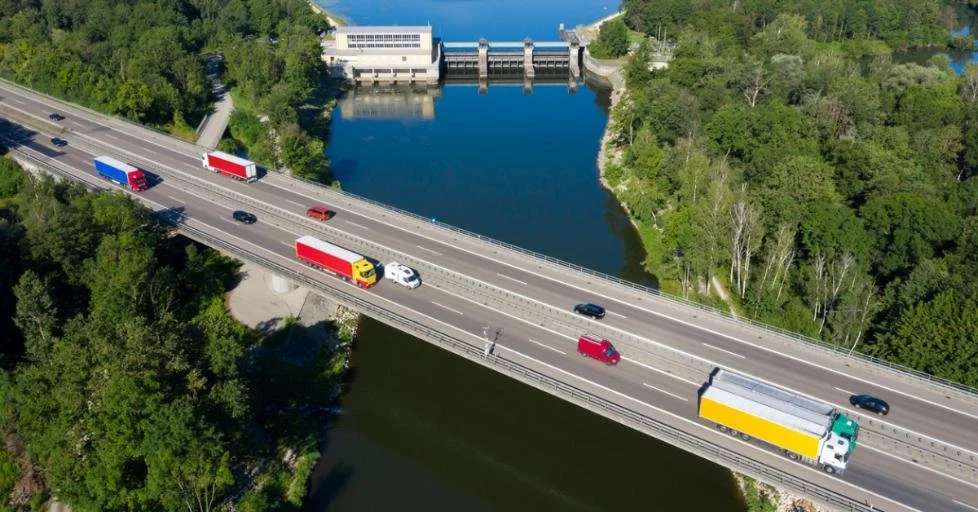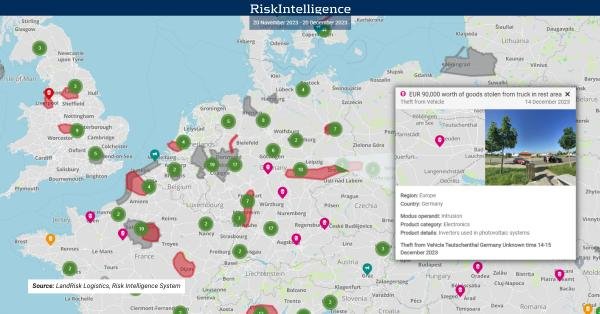Cargo theft: the threat posed by organised criminal groups
20 December 2023
Cargo theft criminals have been keeping the LandRisk Team busy during Q4 this year. Of particular interest is the presence of organised criminal groups (OCGs) carrying out cargo thefts on main logistics routes in Germany.
By Steve Bacot, LandRisk Manager
OCGs present a significant threat to logistics operators as when they do strike the impact is often much higher due to the increased level of confidence, capability and resources these groups typically employ.
The A-1 motorway between Bremen and Hamburg has been hit particularly hard. On the evening of the 5th November 67 trucks had their trailers slashed in incidents at the Otsetal South, Grundbergsee South and Hatzte service/rest areas. The Stellheide and Ostetal rest/service areas on the A-1 were also hit back on 03 June where another 60 trailer curtains were slashed and goods stolen.
Those with access to LandRisk Logistics can obtain further information on the incident: Theft from vehicle in Germany
On the 14th November 120 monitors were stolen from the Grüner Winkel rest area which resulted in a loss of tens of thousands of Euros. The two Grüner Winkel rest areas which are co-located on the A-1 have suffered seven incidents within the last six months and should be used with caution. In addition on the 02nd December 13 truck trailers had their curtains slashed at the Sottrum service area on the A-1 with EUR 100,000 of electronics stolen from one truck. Fortunately for the operator the criminal’s truck broke down after they had stolen the goods so the police were able to recover the load. However, this still highlights the capability, resources and intent of OCGs to steal large loads and disappear into the night undetected.
Those with access to LandRisk Logistics can obtain further information on the incident: Theft in Germany
Elsewhere OCGs were active on the A-38 and A-9 motorway’s during the evening of the 14th December when they hit three sites. The criminals stole EUR 90,000 worth of photovoltaic systems from a soft-sided truck /trailer parked at the Querfurter South Rest area and auto parts from another soft-sided trailer from the Querfurter North rest area opposite. Just down the road during the same evening at a service area in Osterfeld on the A-9 an OCG stole 600 pairs of shoes valued at EUR 60,000 from a parked truck. It is possible that it was the same OCG operating in all three incidents. OCGs have targeted the Querfurter South rest area previously. On the 5th October criminals stole EUR 50,000 worth of kitchen knives and on 30th November they struck again stealing 13 pallets of Lego valued at EURO 20,000 from a soft-sided trailer parked overnight.
These incidents highlight the vulnerability of using soft-sided trailers when parked at non-secure parking areas overnight and the confidence displayed by OGGs who are willing to take the time and increased risk of detection in targeting such a large number of trucks in single incidents. They also have the resources and capability to steal large loads.
Those with access to LandRisk Logistics can obtain further information on the incident: Theft from vehicle
We know that OCGs will sweep through an area and then move on to stay ahead of law enforcement who patrol motorway services and rest areas in an attempt deter or prevent cargo theft. This makes it hard to predict where the next incident will take place. In addition, there are not enough secure parking areas available which works in the favour of OCGs. Therefore logistics operators are recommended to take additional secure measures when forced to use non-secure truck parking areas for overnight stops.
These can include;
Using hard-sided trailers with high security locks and a trailer intrusion detection system to avoid being the soft target.
Using secure parking areas when available, ideally sites certified to the TAPA PSR or EU SSTPA standards.
Employing TAPA TSR protocols remains the best defence to preventing cargo theft whilst in transit. Logistics operators are recommended to employ TSR protocols to the extent possible and ideally certify to the TSR standard. This will reduce the risk of cargo theft and can also help operators gain competitive advantage by employing robust security measures that are audited by an independent party. This provides a high level of assurance for potential and existing clients that their loads are adequately protected.
LEARN MORE:
Want 24/7 access to unrivalled intelligence? You can keep up to date with the latest cargo theft incidents and other threats that may disrupt the supply chain with LandRisk Logistics:
With Risk Intelligence's LandRisk Logistics you can optimise your risk management and significantly improve your ability to find secure alternative routes when a threat goes up. Get a trial on how integrating route planning, risk assessment and threat alerts in one system can help you to identify the ideal route for your commercial operations.




